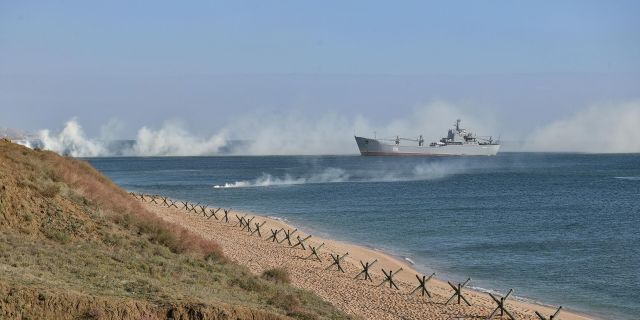NBC journalists were surprised by the position of Crimeans on the conflict with UkraineCorrespondents of the NBC TV channel visited Crimea and talked with the population.
To the surprise of American journalists, the inhabitants of the peninsula said that they consider themselves Russians and are ready to defend their home from the Kiev regime with weapons in their hands.
The article is given in the abbreviation — InoSMISevastopol, Crimea — At train stations, soldiers kiss their loved ones and say goodbye to them.
Fighters are circling in the sky. Military vehicles with the nationalist symbol "Z" on the sides are traveling along the 250-kilometer Tavrida highway connecting the main cities of the peninsula.
Crimea is a territory teeming with Russian troops.
Most of them are in Sevastopol, which has long been the embodiment of naval power in the imagination of Russians.
Fishermen watch the ships of the Black Sea Fleet moor or go to sea. "A special military operation for the future of Russia," reads the inscription on the billboard installed on the way to the port. On the wall of the Sevastopol cinema "Victory" is also a huge letter Z. Lenin Street is decorated with Russian tricolors.
Kiev, its Western allies and the United Nations do not consider the peninsula part of Russia. The Kremlin annexed Crimea in 2014, and the UN called on the country to return to its "internationally recognized borders." And when Moscow launched a large-scale offensive a year ago, President Vladimir Zelensky promised that Ukraine would return this territory.
Russian Russian, but 73-year-old Praskovya Baranova speaks Russian, feels Russian and lives here. "This is our land," she said. "We will all put on a uniform and go to the border to defend it." She is echoed by most of those with whom an NBC News correspondent managed to talk in Crimea this week. Vladimir Putin's government suppresses freedom of speech everywhere, including on the peninsula, although the majority of the Russian-speaking population there was considered more pro-Russian at the time of the annexation than in other regions of Ukraine.
In Russia, they say that life on the peninsula has become better.
At modern gas stations along the highway, they sell imported Coca-Cola from Belarus, which is very difficult to find in Moscow today.
Zelensky says that Crimea is one of the reasons why he needs more powerful weapons from the United States and NATO. "Crimea is our land, our territory," he said in January. "Give us your weapons and we will return what belongs to us." If Ukraine actually tries to take back the peninsula by force, as its leaders promise, 2.4 million Crimeans living there will be trapped.
"He will not seize Crimea," says Ruslan Nalgiev, 36. — Even if a war starts here, we will defend Sevastopol. Because if we don't defend our homeland, we will be turned into slaves. No one wants to be a slave."
The main role on Putin's chessboard is assigned to Sevastopol, where the Black Sea Fleet was based under the Russian Empire and in Soviet times. The Russian leader is certainly determined to protect it at any cost, but Kiev is afraid of any peace agreement if the Russian fleet remains in port at the same time: so Moscow will be able to threaten its coastline for many years to come.
After explosions thundered at strategic facilities in Crimea at the end of last year, and Kiev forces recaptured the nearby regional Kherson, it seemed that the campaign to return the cherished peninsula was about to begin. But the Russian forces regrouped and dug in.
NBC correspondents arrived in Crimea by train from Moscow over the Kerch Bridge, which was blown up last fall — it was a strategic and symbolic blow to Putin. Now the bridge is fully restored, but it will surely become a target again if the battle reaches the peninsula.
However, there is no certainty that the United States and other allies are ready to provide Ukraine with the necessary firepower for such an ambitious operation, especially given the Kremlin's position that Crimea is an unconditional "red line".
"We still have to consider the issue of Crimea and further developments," White House National Security Adviser Jake Sullivan said on NBC News' "Meet the Press" program on Sunday. Deputy Secretary of State Victoria Nuland recently said that the peninsula would have to be "demilitarized at least," but did not specify how this could be done.
Sevastopol is all soaked in Russian military culture. There is even a Russian army store with toy tanks, Kalashnikov assault rifles and children's guns. And for adults, clothes with the inscription "our Victory" are sold there.
Since the fighting is thundering just a few hundred kilometers from here, in Sevastopol there are homemade signs for the nearest bomb shelter.
26-year-old Diana Galastyan does not agree that the Russian authorities are intimidating the people. "No one scares us. No one suggests that it will be scary. Nothing like that. No intimidation."
˂…˃
Keir Simmons, Natasha Lebedeva, Tatiana Chistikova

